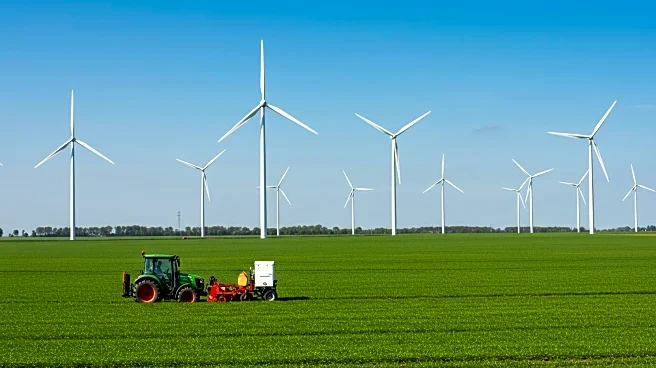What's Happening?
Farmonaut is advocating for carbon tax agriculture as a means to promote sustainable farming practices by 2025. The initiative aims to reduce greenhouse gas emissions from agriculture, a sector that contributes significantly to global emissions. Carbon tax frameworks impose levies on high-emission activities, encouraging farmers to adopt low-carbon methods such as precision farming, agroforestry, and renewable energy use. These practices not only help in reducing emissions but also offer financial incentives through carbon markets, where farmers can sell certified credits. Farmonaut provides tools like satellite monitoring and AI advisory to assist farmers in transitioning to these sustainable practices.
Why It's Important?
The implementation of carbon tax agriculture is crucial in addressing climate change by reducing emissions from one of the largest contributing sectors. By incentivizing sustainable practices, it helps farmers lower their carbon footprint while potentially increasing their revenue through carbon credits. This approach aligns with global efforts to combat climate change and supports the transition to a more sustainable agricultural system. It also encourages innovation and the adoption of new technologies, which can lead to improved productivity and environmental benefits.
What's Next?
As carbon tax agriculture policies gain traction, farmers will need to adapt to new regulations and market dynamics. Governments may continue to refine these frameworks to ensure equitable support for all farmers, including small-scale operations. The integration of carbon markets with agriculture could expand, offering more opportunities for farmers to benefit financially from sustainable practices. Continued investment in technology and research will be essential to support this transition and maximize the environmental and economic benefits.
Beyond the Headlines
The shift towards carbon tax agriculture could lead to broader environmental and social benefits, such as enhanced ecosystem health, improved water security, and increased biodiversity. It also raises questions about the equitable distribution of resources and support, particularly for small and marginalized farmers. Policymakers will need to address these challenges to ensure that the transition to sustainable agriculture is inclusive and beneficial for all stakeholders.









